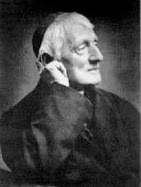 Today is the Feastday of St. Thomas More, my patron saint, and of his companion in martyrdom, St. John Fisher. Thomas More, of course, resigned his post as Chancellor of England rather than go along with Henry VIII's attempt to make himself Supreme Head of the Church in England. John Fisher was Bishop of Rochester at the time and the only one in the House of Bishops who challenged Henry head on, and he lost his head for it on this date in 1535. Thomas More followed him on July 6.
Today is the Feastday of St. Thomas More, my patron saint, and of his companion in martyrdom, St. John Fisher. Thomas More, of course, resigned his post as Chancellor of England rather than go along with Henry VIII's attempt to make himself Supreme Head of the Church in England. John Fisher was Bishop of Rochester at the time and the only one in the House of Bishops who challenged Henry head on, and he lost his head for it on this date in 1535. Thomas More followed him on July 6.Considering the upheaval that King Henry precipitated in subsequent years and which was continued by his daughter, Elizabeth I, I wonder that there is anyone today willing to make excuses for either of them. And yet, even my own actions (or inaction, to be more precise) served as an apology for the English schism.
John Henry, Cardinal Newman spoke the truth when he said that "to be deep in history is to cease to be a Protestant." One of the first things that pricked my own conscience regarding the roots of Anglicanism was my study of English History as an undergraduate. I was a mediocre student in those days, but I did read and pay close attention to the part about the dissolution of the monasteries. It made me uneasy, and it planted seeds of doubt in my mind about the Anglican experiment. That is, I wondered whether any project which began with what amounted to a giant government land grab was doomed to failure in the end. Yet it would be another 25 years before I concluded that I had to return to the Church of my pre-Reformation ancestors, the Catholic Church.
In 2004, two years before we sought reception into the Catholic Church, my husband and I visited the ruins of Fountains Abbey in North Yorkshire.
 Seeing that empty shell brought home to me the real consequences of Henry's ambitions, and it increased my uneasiness with their historical fruits. It also saddened me, not only because of the wanton destruction of the beautiful Abbey Church, but also because of the social upheaval that followed, since the wealth of the Abbey functioned as an important social "safety net" for the poor in the region. My husband and I both count that trip as a significant stage of our journey from Canterbury to Rome.
Seeing that empty shell brought home to me the real consequences of Henry's ambitions, and it increased my uneasiness with their historical fruits. It also saddened me, not only because of the wanton destruction of the beautiful Abbey Church, but also because of the social upheaval that followed, since the wealth of the Abbey functioned as an important social "safety net" for the poor in the region. My husband and I both count that trip as a significant stage of our journey from Canterbury to Rome.Of course, the persistent prayers of St. Thomas More--and St. John Fisher, and (soon-to-be) Blessed John Henry Newman--had a great deal to do with getting us here, too. No doubt the promulgation by Pope Benedict last November of Anglicanorum coetibus is also a result of their prayers.
We would do well to join with them in praying for the Holy Father's upcoming visit to the UK in September, that it might help further our Lord's desire that we might all be one.
Almighty Father, whose blessed Son before his passion prayed for his disciples that they might be one, even as thou and he are one: Grant that thy Church, being bound together in love and obedience to thee, may be united in one body by the one Spirit, that the world may believe in him whom thou didst send, the same thy Son Jesus Christ our Lord; who livest and reigneth with thee, in the unity of the same Spirit, one God, now and forever. Amen.
Collect For the Unity of the Church
Book of Divine Worship
Book of Divine Worship






No comments:
Post a Comment